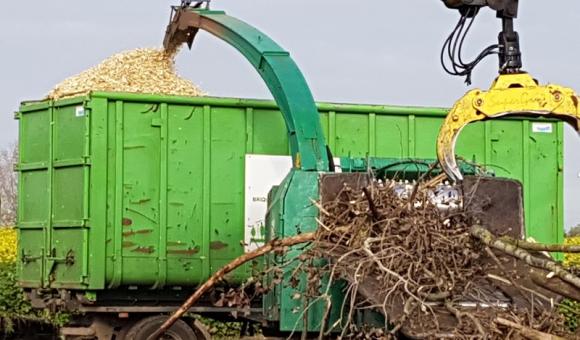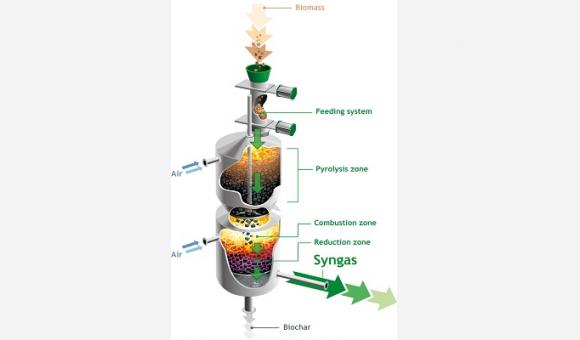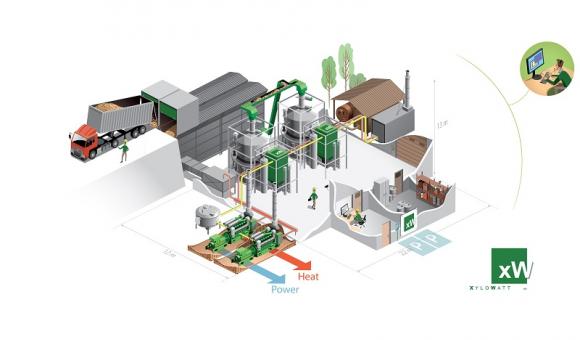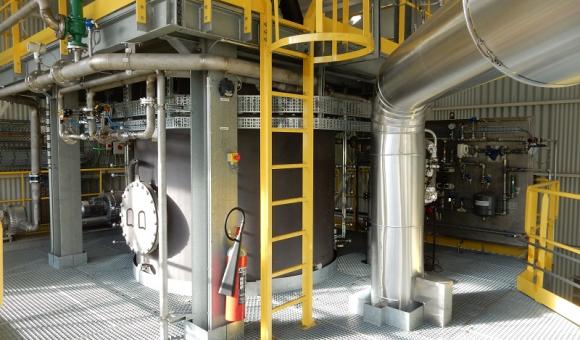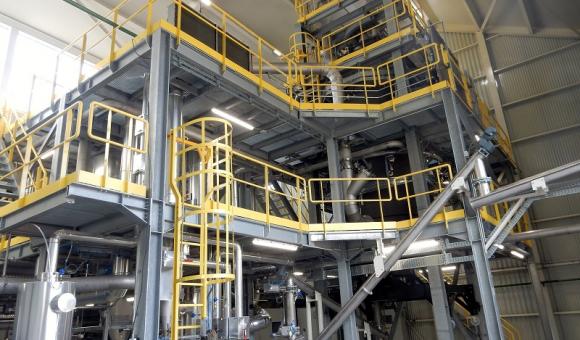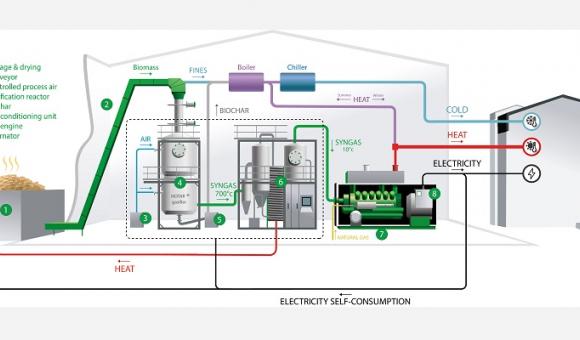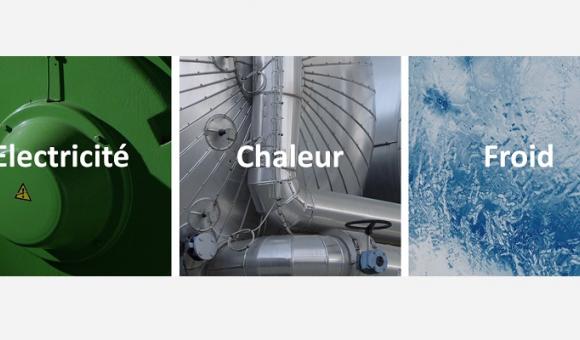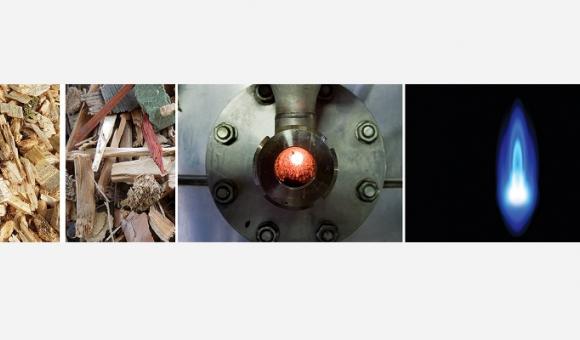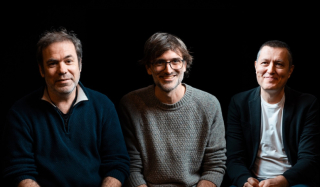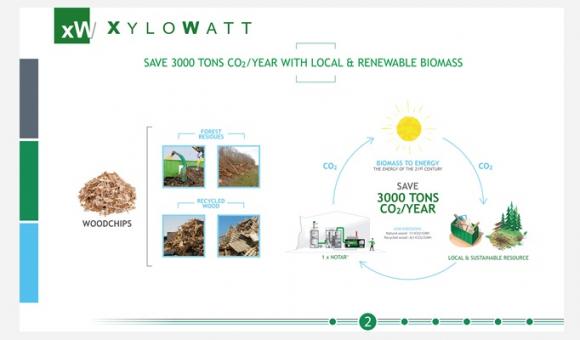
Notar®, developed by Xylowatt, is an innovative and patented technology that produces clean, renewable gas from the gasification of natural and recycled wood biomass. This UCL spin-off has just been recognised as one of the "1,000 effective solutions" selected by the Solar Impulse Foundation.
In 2017, UCL's Mont-Godinne University Hospital became the first Belgian hospital powered chiefly with green energy. A breakthrough resulting from its partnership with Xylowatt. Because of this, the facility has reduced its high consumption of natural gas by replacing fossil fuels with renewable gas generated from local biomass from forest waste and recycled wood. This is the first tri-generation unit in Belgium capable of producing electricity, heat and soon cold, supplying a hospital site with renewable energy from the gasification of biomass thanks to a technology called Notar® developed by Xylowatt. Thanks to this partnership with Xylowatt, the hospital is successfully meeting its environmental goals by supplying its facilities with locally produced green energy. The renewable synthetic gas produced by this technology feeds the existing cogeneration engine and meets the energy needs of Mont-Godinne University Hospital, 24 hours a day, 7 days a week. The hospital uses the energy produced to power and heat its facilities throughout the year, covering 40% of its electricity, 65% of its heat and soon 40% of its refrigeration needs. Sources of energy can include wood chips, made from natural wood waste, such as branches and highway clean-up waste, and recycled wood, such as unusable pallets and wooden packaging. On 3 December 2019, GRDF (Gaz Réseau Distribution France) visited the Mont-Godinne plant as part of its efforts to roll out green gas on the French national grid and its search for new renewable gas production technologies.
Innovative technology and the circular economy
Xylowatt developed the Notar® reactor, an innovative and patented technology that produces a clean synthetic gas, with no residual tar, from the gasification of natural and recycled wood biomass, available locally and thus recovered as renewable energy. "The Notar® reactor is the only medium-power industrial gasifier producing clean syngas (hence its name, No-tar) at the reactor output," explains Geoffroy Corbisier, Business Development Manager at Xylowatt. Combined with a cogeneration engine, it produces electricity, heat and cold at powers of 1 to 5 MW of renewable gas. The electricity can be used to cover local needs or sold on the power grid. Heat is available for a wide range of heating applications. And unused heat can be recovered for cooling applications."
Not dependent on wind or sunshine, Notar® gasification technology offers an alternative for the continuous production of renewable energy from local, renewable and accessible biomass, including recycled wood, which is fully in line with a circular and environmental economy. "What makes this solution so interesting is the fact that it guarantees the production of electricity combined with heat and, if necessary, with cold, in a decentralised and autonomous way, making it possible to manage stocks according to needs, and this, for both the benefit of industrial structures and SMEs/industries or community facilities such as swimming pools or hospitals, or even medium-sized towns". In this way, the city of Tournai (Belgium) has reduced its very high heating and electricity bills from natural gas by replacing fossil fuels with wood gasification to heat and light its swimming pool all year round. This process is also used in France. A gasification plant has been installed in Champagne to power a bottle manufacturer's oven. Wood waste from maintenance on the region's grape vines is collected and the synthetic gas is produced locally to feed a glass bottle oven. This is the first gasification plant on an industrial production site supplying an industrial process. This energy production in the circular economy makes the champagne bottles greener. Demand for the installation of these units is growing internationally, both in Europe (the Balkans) and as far away as Asia (Japan).
A three-step process
Gasification is carried out in three stages. "The first is pyrolysis. The biomass is converted into coal at a controlled temperature. This and the gases escaping from it are directed to a second reactor, the combustion zone. Controlling these flows precisely is key to how the reactor works. High temperature combustion destroys tars and impurities. The final step, reduction, produces a clean renewable gas free of tars. The gas is then fed into the gas conditioning unit. Its temperature is reduced from 650 degrees Celsius to 10 degrees Celsius. The heat produced is used to dry the biomass. The gas is filtered to remove fine particles and condensed to remove residual water. The gas produced is therefore cold, dry and filtered of all impurities allowing its use by a cogeneration engine." The gasification unit operates autonomously and can be remotely controlled from a simple computer.
Internationally active and Solar Impulse label
A UCL spin-off founded in 2001, Xylowatt works on gasification technologies. It has set itself the goal of optimising the production of renewable energy from biomass as much as possible in order to limit both the use of primary resources and the resulting CO² emissions. It designs, builds and manages renewable energy production sites that produce anywhere from 750 kW to 3 MW of electricity from natural and recycled wood waste. The company brings together a fast-growing team, currently composed of 25 highly qualified people. Today, it is working on international industrial projects in several European countries, including the United Kingdom, Italy, the Balkans and Japan. Other projects and developments are in progress.
Notar® has been recognised as one of the 1,000 effective solutions selected by the Solar Impulse Foundation. The "effective solutions" label certifies and proves that the selected solutions are economically profitability and protect the environment. This new and credible symbol serves as a quality hallmark for clean and sustainable products, processes and services. This technology uses wood waste to produce energy. Xylowatt was awarded the label in December 2019, after Notar® was evaluated by several experts from Global Alliance members.
By Jacqueline Remits
This article is from the W+B Magazine n° 148
